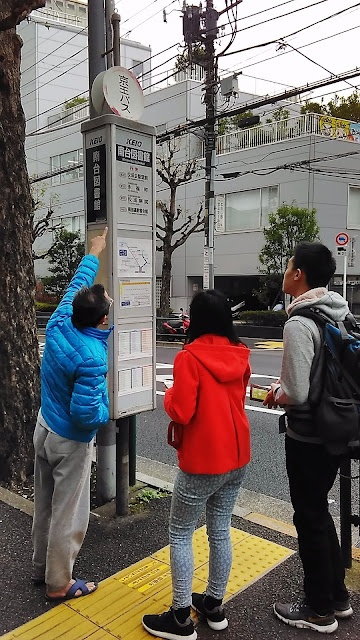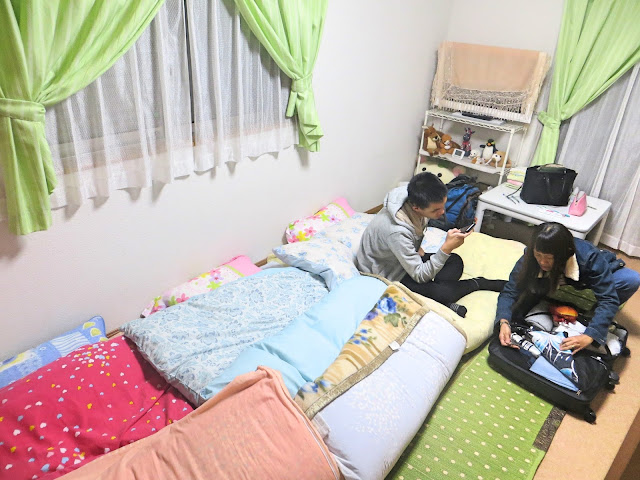Homestay with a Japanese family is the most intriguing experience one can get in the land of rising sun. Not only that it is a much cheaper alternative to cramped-up hotel rooms, Homestay is simply the best way to gain an in-depth understanding of Japanese culture and their way of living. Here, you’ll be granted the front row seat to the daily life of a typical Japanese family, try delicious home cooked food, alcoholic beverages and more.
Japanese culture and norms are very different from back home. So it certainly helps to get some insights and guidance from a local family. Now, time to think of our parts…
How to be a good guest and homestay like a pro on your first visit to Japan?
1. Relax!
Like I said, the idea might sound intimidating to some… so most people get nervous before the actual homestay experience but Don’t sweat it! Believe me, when you thought you are anxious at the thought of pulling a baka gaijin (embarrassing yourself) , the locals are more afraid of YOU! They are probably worrying about their English ability, what to cook for you and creating fun activities... as we speak!Things might be awkward at the beginning, but always bear in mind that sincere smile is the key to smooth things out… No one will expect you to learn all the Japanese norms and ethics before visiting (although it is good to have some basic understanding), so don’t be afraid to make mistakes... and one step at a time, I am sure you will learn to enjoy every moment of it.
So RELAX (as long as you maintain a respectful attitude)! Stop worrying if you are “ being polite enough”.
2. If applicable, mention your special needs or concerns.
If you have medical conditions that need special attention, let your host family know from the get-go. For examples, if you have a sensitive stomach and can’t eat anything raw or you have asthma and will not do well around cigarette smoke or you have type 1 diabetes and shouldn’t eat too much carbs. It is important that you let them know beforehand so they know how to react.3. Prepare a gift.
We actually forgot this part and I hope you don’t repeat our mistake. The best gifts are small, light and can be inexpensive. It is just a way to show your appreciation towards their willingness to share their home. Think of something that best represents your home country! A popular gift from South East Asia is local craft: Batik handkerchief, anyaman, and postcards are good choices. If you are from other western countries, keychains or even regional delicacy can be options!4. The strict “Shoe Off” rule!
In Japan, you should never wear outside shoes inside the house. There is always a designated corner right after you enter the main door where you can take your shoes off, align them the way the other shoes present are aligned and then change into a "house slipper". And that’s not all… when you want to use the bathroom, you need to leave your “house slipper” outside the bathroom door and change to a “bathroom slipper” usually made of plastic or rubber. In short, you’ll have differently designated slippers for different purposes. The only exception will be tatami rooms (rooms with straw mat floors) where you should not wear any footwear.5. Don't be afraid to try new things!
I can’t stress this one enough: Be open to new experiences! If not, what is the purpose of doing a homestay? When in Rome, do what the Romans do. So in Japan, give everything a go! Try things that you wouldn’t normally do: eat raw fish (sashimi), shout “Kanpai” (cheers), go karaoke with your host, sing a Japanese song, put on a Kimono, play video games, visit a manga cafe, go onsen-hopping… who knows you might go back home with a new found interest?6. Treat every culture shock as a precious opportunity to learn.
Your host family is letting their 6-year old walk alone to school? Japanese like to train their kids to be independent starting from a young age. This is something we could really learn from them.7. Set aside time to spend together.
If you are doing a homestay during weekends, I highly recommend that you arrive without any activities planned. Like it or not, expect your host family to overwhelm you with attention… They will want to take you out for a walk, show you their favorite restaurant, attend a festival together, bring you hiking, throw you a welcome party. Say “Yes” to every invite, is your only responsibility. Do the things, get involved.Don’t skip even the mundane errands and house chores, you’ll definitely learn something! Remember you are going all out to experience the everyday life here. For example, going late night shopping introduced us to the world of half-priced Bento.
One reason why I found Japanese to be excellent homestay hosts, is due to their eagerness to share. Accept it with an open heart and mind, all the stuff you do together will help you bond and make you feel like you are really a part of that family. And when its eventually time to say goodbye, you’ve found yourself some friends for life.
8. Don’t always stay in the room.
If you have a private room, treat it as a place to sleep. Even when you feel like reading a book, browsing Facebook, planning activities for the next few days or so, do it in the living room. The sense of “togetherness” will make both sides feel more relaxed and connected.Ps: Even I don’t like it if my guest always stays in the room and have little effort to mingle around. It made me feel more like “just a kind stranger” than “family".
9. Some notes about the Bathtub.
In some countries, you should shower in the bathtub to avoid flooding the place (like in Russia), but in some part of the world (like Japan), showering in the bathtub is a no-no.In most traditional Japanese homes, there will be a bathtub with a cover. Remember to keep it covered while you shower so that you won’t get any soap in it. If you would love a soak, make sure you wash your body thoroughly and rise yourself off any remaining soap before getting into the tub (because the rest of the family will be using the same water for a soak!). Replace the cover when you are done to keep the water warm. In some modernized homes, there the tubs may have heaters for that purpose.
Some foreigners might not like the idea of soaking in the same water which other people has been using. Your host family is well aware of this cultural difference. So most of the time, guests are offered to take the first bath. Do take it out of respect.
Fact: Traditionally, the father gets to bathe first, followed by the mother and then the children (eldest to youngest).
10. Enjoy your Toilet experience.
You may be surprised at a crazy amount of buttons and tempted to try them all. Yes do give them a try but try not to change the settings. You can read this article to learn more about the buttons.11. Make your own bed.
Living authentically in Japan often mean sleeping on folded mattress/ futon in a tatami room. If you were given a private room, then you may not have to do this, but if you sleep in a common area (living room) or shared bedroom, make sure you air out and fold up your futon bed nicely and place it aside in the morning. Japanese rooms are usually small, so always make space for others.12. Basic Table Manners.
I am not a pro in this matter but some basic table manners are universal, here are some points that you might find foreign:Before the meal:
- Wait for everyone to be served first before eating (or even drinking).
- Wash your hands before eating. ( In a restaurant, you’ll be given a small rolled-up wet cloth. Do not use it to wipe any parts of your body other than hands)
- “Itadakimasu” means you are thankful for the food. Proclaim it before you dig in.
During the meal
- Eat everything your host offers you, or at least try. I understand that some dishes look rather scary (like baby octopus or slimy seaweed) if you’re not already familiar with Japanese cuisine. However, don’t turn it away upon first look. Try and if you really don’t like it, refuse a second serving. That is the most polite way to show that you don’t like the food.
- Slurping noodles is considered polite in Japan! It shows that you enjoy the food.
- Your elbows should not touch the dining table.
- Try to use chopsticks. If you aren’t good at it, it is okay to pick your rice bowl up and hold it close to your mouth.
- Do not “double dip” your food in sauce. This is considered very offensive in some part of Japan.
- Do not place your chopstick in your bowl when you pause. Place them on top or align them beside instead.
13. Learn how to speak basic Japanese
Usually, homestay hosts won't expect you to know Japanese, but they’ll be delighted at your effort. So before your next homestay, try to pick up a few basic phrases… (That is maybe just them being nice, but) I found Japanese to be very easily impressed (correct me if I am wrong), they seemed to be amazed when you speak some Japanese (even basic ones) or know something about their culture.Don’t sweat the language. There’ll certainly be times when both sides struggle to understand each other but that will eventually turn into hilarious memories.
14. Show gratitude.
“Arigato gozaimasu” is perhaps the most important word to learn before visiting Japan, simply because Japanese people are so nice you’re bounded to experience their kindness everywhere (well, as long as you stay respectful. ) but on top of that, I am sure your homestay host is gonna be the nicest person you meet in Japan.Japanese don’t just share their home casually, instead, from what I saw, they take hosting responsibility seriously. So, remember to show appreciation for your host’s hospitality at every opportunity. Thank them, compliment them for their hard work, put on a sincere smile, engage in conversations, offer to help before and after meals…
15. Respect house rules
This depends on the household. Some homes may have curfews and some may not. Usually, Japanese are very protective of their privacy, so before you upload any pictures of their home or them on the internet, always ask for permission.That is all from me for now!
Feel free to share more tips with me!
So what do you think? Are you ready to experience a Homestay in Japan? If you are ready to step out of your comfort zone, log on to Homestay.com and start looking for your ideal host now!
Read more: My own Homestay experience in Tokyo
------------------------
Follow me on Instagram if you would like to see more photos!
📌For more travel tips, like Eat Love Travel Breathe with Miss HappyFeet.
📌Subscribe to the monthly newsletter for exclusive travel deals, tips, free E-books, monthly giveaway and travel coupons!
----------------------
Thank you for reading!







No comments:
Post a Comment